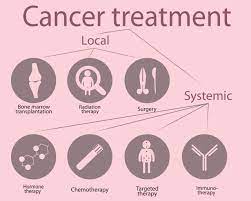
Advancements in Oncology Treatments: Empowering Patients in the Fight Against Cancer
The Advancements in Oncology Treatments: Empowering Patients in the Fight Against Cancer
Cancer, a formidable adversary affecting millions of lives worldwide, has spurred relentless efforts in the field of oncology to develop advanced treatments that offer hope and improved outcomes. Over the years, remarkable progress has been made in understanding cancer biology, diagnosis, and treatment options. The evolution of oncology treatments has revolutionized the way we approach this complex disease.
One of the most significant advancements in oncology is precision medicine. This approach tailors treatment plans to each patient’s unique genetic makeup and specific characteristics of their cancer. Through genetic testing and molecular profiling, oncologists can identify specific gene mutations or biomarkers that drive tumor growth. Armed with this knowledge, they can prescribe targeted therapies that specifically block these molecular abnormalities.
Targeted therapies have proven to be highly effective in treating various types of cancers such as breast, lung, colorectal, and melanoma. Unlike traditional chemotherapy drugs that attack both healthy and cancerous cells indiscriminately, targeted therapies aim to disrupt specific signaling pathways or proteins involved in tumor growth. This precision minimizes damage to healthy cells and reduces side effects while maximizing therapeutic benefits.
Immunotherapy is another groundbreaking approach that has transformed the landscape of cancer treatment. Harnessing the body’s immune system to recognize and destroy cancer cells, immunotherapy drugs have shown remarkable success in treating various malignancies including melanoma, lung cancer, bladder cancer, and certain types of leukemia.
One particularly promising area within immunotherapy is immune checkpoint inhibitors. These drugs work by blocking proteins on immune cells or cancer cells that prevent immune responses from attacking tumors effectively. By removing these checkpoints, immune checkpoint inhibitors unleash the body’s natural defense mechanisms against cancer cells.
Another notable advancement is the development of CAR-T cell therapy (Chimeric Antigen Receptor T-cell therapy). This groundbreaking treatment involves modifying a patient’s own immune cells to express a receptor that recognizes and targets cancer cells. CAR-T cell therapy has shown remarkable success in treating certain types of blood cancers, such as acute lymphoblastic leukemia (ALL) and non-Hodgkin lymphoma.
Furthermore, advancements in radiation therapy have significantly improved treatment precision and reduced side effects. Techniques such as intensity-modulated radiation therapy (IMRT), stereotactic body radiation therapy (SBRT), and proton therapy allow for highly targeted delivery of radiation to tumors while minimizing exposure to surrounding healthy tissues.
While these advancements have undoubtedly revolutionized oncology treatments, it is important to note that multidisciplinary care remains crucial. Oncologists collaborate with surgeons, radiologists, pathologists, and other healthcare professionals to develop comprehensive treatment plans tailored to each patient’s needs.
Moreover, supportive care plays an integral role in ensuring optimal outcomes for patients undergoing oncology treatments. Palliative care services focus on managing symptoms, improving quality of life, and providing emotional support throughout the cancer journey. Integrative therapies such as acupuncture, massage, and mindfulness techniques complement traditional treatments by addressing the physical, emotional, and psychological aspects of cancer care.
The field of oncology continues to evolve rapidly with ongoing research and clinical trials exploring new treatment modalities. From targeted therapies to immunotherapies and advanced radiation techniques, the future holds great promise for further improving cancer outcomes.
As we witness these remarkable advancements in oncology treatments, it is essential to acknowledge the tireless efforts of researchers, healthcare professionals, patients, and their families who collectively contribute towards conquering this devastating disease. Together, we stand at the forefront of a new era in cancer care where personalized medicine offers hope for a brighter future.
“Challenging Battles: The Most Difficult Cancers to Treat and Cure”
3. “Beyond the Consultation Room: Unspoken Aspects of Onc
- What cancer has the lowest life expectancy?
- What is the hardest cancer to cure?
- What your oncologist doesn t tell you?
- What are 3 popular treatments for cancer?
What cancer has the lowest life expectancy?
It is important to note that life expectancy can vary greatly depending on various factors, including the stage of cancer at diagnosis, the individual’s overall health, and the effectiveness of available treatments. While it is difficult to pinpoint a specific type of cancer with the lowest life expectancy, some aggressive cancers such as pancreatic cancer, liver cancer, and certain types of lung cancer are generally associated with poorer prognosis. However, it is crucial to consult with healthcare professionals who can provide personalized information based on an individual’s specific circumstances and medical history. Early detection, timely treatment, and ongoing advancements in oncology offer hope and improved outcomes for individuals facing any type of cancer.
What is the hardest cancer to cure?
Cancer is a complex disease with various types and stages, each presenting unique challenges in terms of treatment and prognosis. While it is difficult to pinpoint a single “hardest” cancer to cure, certain types are generally associated with more aggressive behavior and lower survival rates. Cancers such as pancreatic cancer, liver cancer, lung cancer (especially small cell lung cancer), and brain tumors often pose significant challenges due to factors like late-stage diagnosis, limited treatment options, and the aggressive nature of the disease. However, advancements in oncology treatments continue to offer hope for improved outcomes across all cancer types, emphasizing the importance of early detection, personalized treatment approaches, and ongoing research efforts.
What your oncologist doesn t tell you?
When it comes to oncology treatments, there are often questions and concerns that patients may have, including what their oncologist might not disclose. While every situation is unique and communication styles may vary, it’s important to remember that oncologists strive to provide comprehensive and transparent information to their patients. However, due to the complexity of the disease and the wide range of treatment options available, it is possible that certain details or alternative therapies may not be discussed in depth during initial consultations. Patients are encouraged to actively engage in open dialogue with their oncologists, ask questions, seek second opinions if desired, and explore additional resources to ensure they have a complete understanding of their diagnosis and treatment options.
What are 3 popular treatments for cancer?
When it comes to cancer treatment, there are several popular and effective approaches that have gained recognition in the medical field. Three commonly used treatments for cancer include surgery, chemotherapy, and radiation therapy. Surgery involves the removal of cancerous tumors or tissues through surgical procedures. Chemotherapy utilizes powerful drugs to kill cancer cells or prevent their growth by targeting rapidly dividing cells throughout the body. Radiation therapy, on the other hand, employs high-energy radiation beams to destroy cancer cells and shrink tumors. These treatments are often used individually or in combination, depending on the type and stage of cancer, as well as the patient’s overall health condition. It is important to note that treatment plans are personalized for each patient under the guidance of oncologists and healthcare professionals.


